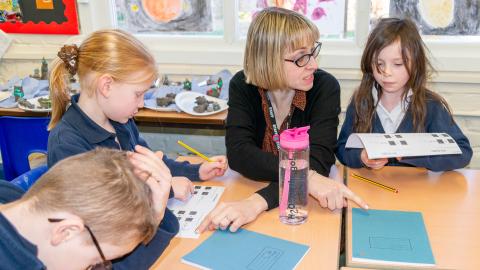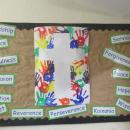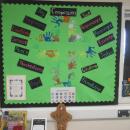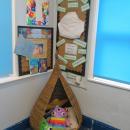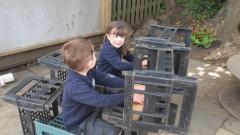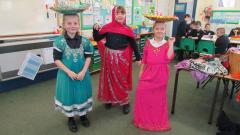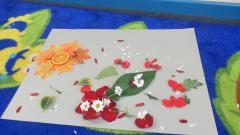R.E.
‘’All major religious traditions carry basically the same message, that is love, compassion and forgiveness - the important thing is they should be part of our daily lives.’’
- Dalai Lama
Intent
R.E. is an academic subject but also provides opportunity for pupils to understand what it means to be a religious believer in the world today and to encounter the values of the Christian community of their school. RE in the Church school should support pupils to recognise and act on the insights, principles, beliefs, attitudes and values that should influence, inspire or guide them in life.
We believe that RE offers the chance for all members of the school community to develop their spirituality, reflecting on their own values and beliefs and growing in respect for and understanding of those who are different from them. At our school, pupils and their families can expect a high-quality religious education (RE) curriculum that is rich and varied, enabling learners to acquire a thorough knowledge and understanding of a range of faiths and worldviews. We teach according to the North Yorkshire SACRE Agreed Syllabus.
According to the R.E. Council, ‘the ability to understand the faith or belief of individuals and communities and how these may shape their culture or behaviour, is an invaluable asset for pupils in modern day Britain.’ At Chapel Haddlesey School, in line with North Yorkshire Agreed Syllabus for Religious Education, R.E. lessons will provoke challenging questions about meaning and purpose in life, beliefs about God, ultimate reality, issues of right and wrong and what it means to be human. As a school we provide a safe, nurturing space where pupils can share their ideas and thoughts in a trusting and forgiving environment. We will encourage pupils to learn about religious and non-religious worldviews in order to discover, explore and consider different answers to these questions. They will learn to interpret, analyse, evaluate and critically respond to the claims that religious and non-religious worldviews make. Pupils will learn to express their insights and to agree or disagree respectfully. Our pupils are encouraged to ‘branch out together’, acknowledging and celebrating the unique attributes, beliefs, and spiritual connections within our school community.
Our curriculum is designed to help pupils deepen their knowledge and understanding about a range of religious and non-religious worldviews so that they can:
- describe and explain beliefs and theological concepts;
- describe and explain some sources of authority and teachings within and across religious and non-religious traditions;
- describe and explain ways in which beliefs are expressed;
- know and understand the significance and impact of beliefs and practices on individuals, communities and societies;
- connect these together into a coherent framework of beliefs and practices;
- gain and deploy deepening understanding of specialist vocabulary and terms;
- know and understand about religious diversity within the region, as well as nationally and globally;
- know and understand how religion can be defined and what is meant by the term “religious and non-religious worldviews” and with increasing clarity, know that these worldviews are complex, diverse and plural;
- gain and deploy skills that enable critical thinking and enquiry in relation to the material they study;
- reflect on their own thoughts, feelings, experiences, ideas, values and beliefs with increasing discernment.
Implementation.
As a church school, the teaching of Christianity is at the heart of our RE curriculum. We aim to embed the ‘Understanding Christianity’ resource to develop an enquiry approach, engaging with significant theological concepts and the pupil’s own understanding of the world as part of their wider religious literacy. Links with our school vision, and support for pupil’s spiritual, moral, social and cultural (SMSC) development are intrinsic to our RE curriculum and have a significant impact on learners. We provide a wide range of opportunities for learners to understand and to make links between the beliefs, practices and value systems of the range of faiths and worldviews studied. Our curriculum gives pupils the opportunities to develop into well-rounded individuals, whose religious literacy enables them to build friendships based on trust and forgiveness.
R.E. is taught in a weekly lesson, by each class teacher. ‘Understanding Christianity’ is implemented alongside the North Yorkshire Agreed Syllabus; both are used to support the teaching of RE across all age groups. The curriculum is divided into four separate 2 year rolling programmes to ensure even and thorough coverage of the key religions as set out in the North Yorkshire Agreed Syllabus: see the Long-term plan for RE for further details. Work is recorded in Literacy books and is evidenced using a variety of outcomes as suggested by the agreed syllabus.
E.Y.F.S. pupils will also be provided with enhancements within provision that spark curiosity, encourage debate and enquiry, and enable pupils to discuss their knowledge through play. The Class 1 team will enhance provision to match either the interests of pupils or current religious/world festivals. By providing opportunities to explore religions and worldviews through play, staff are able to foster a trusting and respectful environment, where all pupils have the opportunity to collaborate with others in a way that allows them to foster positive, trusting and forgiving relationships with peers and adults alike.
R.E is taught through three lenses that help our pupils develop skills of Religious enquiry and deepen their knowledge of the ‘Golden threads’ within key religions. Pupils will develop Religious enquiry skills through the use of R.E. lenses. Our lenses are Theology, Philosophy, and Social and Human science, detailed below.
|
Theology (Believing) |
Philosophy (Thinking) |
Human and Social Science (Living) |
|
This is about looking at where beliefs have come from, how far they have changed over time, how they are applied differently in different contexts and how the they relate to each other. Developing skills of reading and interpretation; understanding how believers interpret, handle and use sacred texts; making sense of meaning of texts for adherents. |
This is about finding out how and whether things make sense. It deals with the questions of morality and ethics. It takes seriously questions about reality, knowledge and existence. Evaluating, reflecting on and connecting the texts and concepts studied, and discerning possible connections between these and pupils’ own lives and ways of understanding the world. |
This is about exploring the diverse ways in which people practise their beliefs. It engages with the impact of beliefs in individuals, communities and societies. Examining ways in which believers respond to sacred texts and teachings, and how they put their beliefs into action in diverse ways within their religious community and in the world. |
Our R.E curriculum offers opportunities for personal reflection and pupils’ spiritual, moral, social and cultural development as it encourages pupils to examine the significance of their learning in relation to themselves and others. Our RE enrichment opportunities also provide pupils with further opportunities to develop religious literacy skills. This enables them to build friendships with those who have different views.
As such Religious Education is central to good local, national and global citizenship. It makes a significant contribution to the active promotion of mutual respect and tolerance of others’ faiths and beliefs, a fundamental British value. It prepares pupils for life in modern Britain, where trust, forgiveness and friendship are core values to life.
Impact
Throughout the RE curriculum, pupils will gain a wealth of knowledge and understanding of religions and worldviews, and the traditions and festivals associated with these. With the aid of subject knowledge organisers, pupils will acquire a range of key religious vocabulary and religious literacy skills.
Pupils will feel confident to express what they have learnt about a religion and from a religion, trusting that their understanding and views will be heard within a caring and supportive environment. The impact will be evidenced by pupils showing confidence in speaking to other pupils and in communicating about their needs, opinions and things that are important to them.
Pupils will also be able to compare similarities and differences between different world faiths and views. Pupils will be able to understand how religion impacts upon the way people live, and how it influences their family lives and traditions. In Early Years, pupils will develop an awareness of special times in their own lives and those of their friends. They will also notice similarities and differences between themselves and others and among families, communities and traditions. KS1 and KS2 pupils will develop skills of RE enquiry, demonstrating how to respectfully learn about the views and beliefs of others, while maintain a trusting and respectful environment for all within the school community. This will be evidenced via discussions and debates within the classroom, and through writing in Literacy books, alongside the use of knowledge organisers.
As a consequence of the broad base of knowledge, pupils will show tolerance and respect for others and value their belief system. They will develop the skills to be able to understand viewpoints of others and be able to evaluate their own thinking in light of others’ opinions. Pupils will form positive relationships with adults and other pupils, modelling the core School values of trust, forgiveness and friendship, fostering the vision of ‘one family branching out together.’
Through their R.E. learning, pupils are able to make links between their own lives and those of others in their community and in the wider world, developing an understanding of other people’s cultures and ways of life. Pupils understand what it means to be a good citizen and as such, show appreciation of others and understand how they contribute to the wider community. Pupils will develop the skills, knowledge and understanding they need for life in a diverse multi-cultural global society, where they can exist in harmony with others and live life to the full. Pupils will be confident in not only contributing to the wider community, they will develop the values and beliefs needed to engage with social action challenging injustice and misconceptions, becoming advocates for justice for all.

